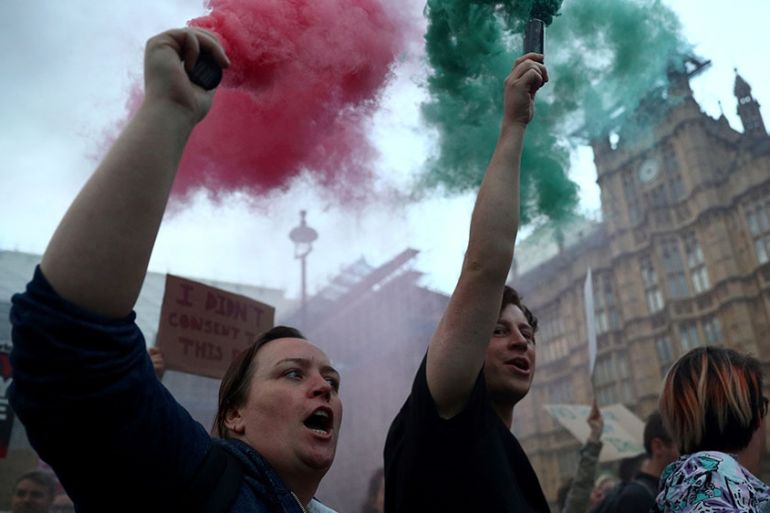Brexit proxy: Pound plunges to three-year low, then claws back
Barring an October 2016 flash crash, sterling has not regularly traded below $1.20 since 1985.

The pound is a proxy for Brexit uncertainty and Tuesday showed just how acute it has become.
Sterling endured a whipsaw day on Tuesday, sinking to a three-year low below $1.20 only to claw back above the key threshold after a cross-party alliance defeated Prime Minister Boris Johnson in parliament in an effort to block a “no-deal” Brexit.
Keep reading
list of 4 itemsNorthern Ireland agreement could end deadlock, restore government
Forced to become British: How Brexit created a new European diaspora
Number of Britons regretting Brexit hits new record high: Survey
The vote led Johnson to push for a snap election.
The pound, which has lost nearly 20 percent of its value since the United Kingdom voted to leave the European Union in 2016, fell to as low as $1.1959 but then rebounded after Johnson lost his working majority in the British parliament on Tuesday following the defection of one of his Conservative Party MPs.
Barring an October 2016 flash crash when sterling briefly reached $1.15, sterling has not regularly traded below $1.20 since 1985, according to Refinitiv data.
Traders in London said heightened uncertainty was making investors panic, as the battle over Brexit reaches a crescendo this week.
Many fear that the UK will either crash out of the European Union on October 31 without a transitional deal or face an election that would generate more unpredictability when the economy is already struggling.
MPs on Tuesday began their bid to stop what they say would be an economically damaging exit from the EU without a transition deal.
They voted shortly after 20:00 GMT on the first stage of their plan to block Johnson’s Brexit plans before the October 31 deadline. The prime minister on Monday implicitly warned members of parliament he would seek an election if they tied his hands.
“The next 48 hours will determine whether or not this high- risk strategy from the prime minister has paid off, or whether or not he has been corralled into a corner, or conversely still there a several options where we are simply going for the uncertainty of an election mid-October,” said Andrew Milligan, head of global strategy at Aberdeen Standard Investments.
Oliver Blackbourn, a portfolio manager at Janus Henderson Investors, said sterling was “heading towards 1.10ish versus the dollar if we move towards a more negative outcome”. Any encouraging news would trigger a bounce in the pound because so many investors were betting against it, he said.
Banks raised their estimates for the likelihood of a no-deal Brexit. UK domestic-focused stocks such as housebuilders skidded.
Against the euro, the pound fell to a two-week low of 91.47 pence.
Sterling did stage a rebound in late European trading, moving back into positive territory after Johnson lost his working majority in parliament when one of his MPs defected to the pro-EU Liberal Democrats.
Fritz Louw, a currency analyst at MUFG, said that in the “immediate near-term”, the defection made a no-deal Brexit slightly less likely, but he added the bounce was likely to be short-lived.
The pound hit as high as $1.2103, up 0.3 percent on the day, and was holding above $1.20 in early Asian trading.